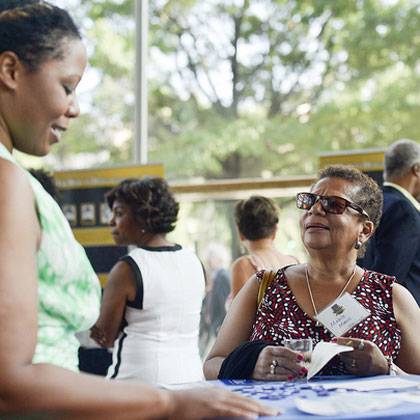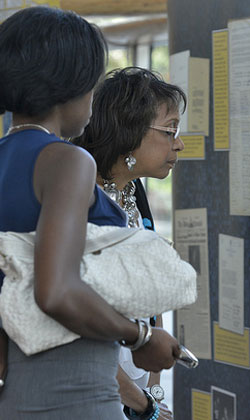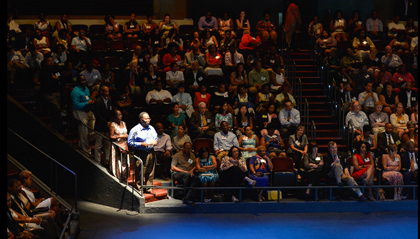Making it Right
Black alumni gathered in D.C. last weekend for an evening of reflection on their Duke experiences


On the heels of President Obama's remarks last week regarding the disconnect between the black and white experience America, more than 400 predominately African-American Duke alumni gathered in Washington, D.C. to commemorate the integration of the university 50 years ago.
It set the tone for a night of candid conversation about the conflicted feelings many African-American alumni have about their student experience.
The event at D.C.'s Arena Stage included a reception and remarks by Duke Alumni Association board vice president D. Michael Bennett, '77, and David Rubenstein, '70, who gave his first speech as the newly elected chair of the university's Board of Trustees.
"I am disappointed that we have to mark 50 years," Rubenstein said. "I wish we were celebrating 100 years of black students at Duke, or, better yet, I wish it had been integrated from the beginning. Diversity is one of the key things behind building a great university."
In January, Duke embarked on a nine-month commemoration honoring the first five African-American undergraduate students to matriculate at the university in 1963. The commemoration also honors the first African-American graduate students, as well as the contributions of black alumni, faculty and staff. At a series of regional events in New York, Atlanta, Boston and Los Angeles, alumni have reflected on the black experience at Duke.
This past weekend in D.C., Rubenstein shared his personal story as a Jewish student at Duke in the late '60s where he filled out the form "the night before it was due" despite the crucifix in the admissions literature. "There was a quota of Jews in those days too," he said.
He entered when the first five students were seniors; coming from a predominately black and Jewish high school, he said Duke was culture shock for him.
"I decided to stay and make the best of it," he said. "The reason Duke has become one of the best schools in the world is because people stayed. I decided to persevere and many of you did too."
Today, Rubenstein said, Duke accepts more African-American students than many of its peer institutions but numbers are not enough, he said. "How welcoming is the environment? If you had said 'I'm not happy' and left, Duke wouldn't be where it is."


Nia-Malika Henderson, '96, a national political reporter for The Washington Post, moderated a discussion of distinguished black alumni, saying, "It seems like we need a collective therapy session."
The panel included: Grant Hill, '94, a retired NBA basketball player; Maurice Wallace, Ph.D. '95, a Duke professor of English and African and African American Studies; Dr. Lynt Johnson, '81, a professor and chair of the Department of Surgery and Chief of Surgical Services at Georgetown University Hospital; and Alex Swain, '13, the 2012-13 Duke student body president.
Wallace said he'd thought about leaving Duke at one point and mentors in the English department convinced him to stay. And while Henderson indicated black faculty hiring is at an all-time high, Wallace said, "we can ill afford to let that turn into celebration. Retention is another thing."
"It's important that black faculty show up in China and (in courses taught) online," he said. "I'm excited for our global reach, but Duke also should maintain its footprint in Durham and the region" given the current state politics.
Johnson said black alumni are disconnected from the university because they do not have a sense of ownership. "It's almost like they borrowed a piece and had to give it back," he said. "We can't allow (the 50th commemoration) to be a one-time event."
Swain said her involvement in student government had helped her "own" her Duke experience.
"You take ownership by taking advantage of opportunities," said Swain who studied abroad. "It broadens your perspective on life."
When asked how Duke's black alumni can move past painful memories, Johnson said that he felt Duke President Richard H. Brodhead has extended an olive branch to them in a genuine way, to "make it right."
Hill said that despite reports of a "charmed existence," the challenges he endured at Duke -- as a basketball player trying to acclimate and still retain his racial identity -- have prepared him for the real world.
"I use my Duke experience every day," he said.
They said there are signs that the black experience at Duke is getting better for the younger generations.
Shep Moyle, '84, incoming president of the Duke Alumni Association, was student body president in the early '80s when he chaired a task force on black/white relations.
"These issues have been in front of us all along," he said, hopeful that the event would "help us learn from the past to look forward."
Dionne Brown, PPS '94, did not have a positive experience as a student but said her alumni experience has been much better.
"This event makes me feel valued, like the university has no regrets about admitting me," said Brown.
Abrielle Anderson, '98, a member of the D.C. alumni planning committee, said that she was proud that the school has been transparent about "the painful parts."
"I'm proud of the university that I love to be investing so much into commemorating this milestone," she said. "I love Duke with all the fiber of my being and I know my Duke friends feel the same way. It's pretty special to be a part of the first 50 years of black students at Duke."
The public conversation will continue this fall during Duke's Founders' Day weekend, Oct. 4-6, with a series of events and gala to conclude the 50th commemoration.
For more information and updates on the gala weekend, visit the 50th website, spotlight.duke.edu/50years. Photos from the event can be found here.
Below: A short video produced by black alumni featured a series of candid alumni interviews about black life at Duke.